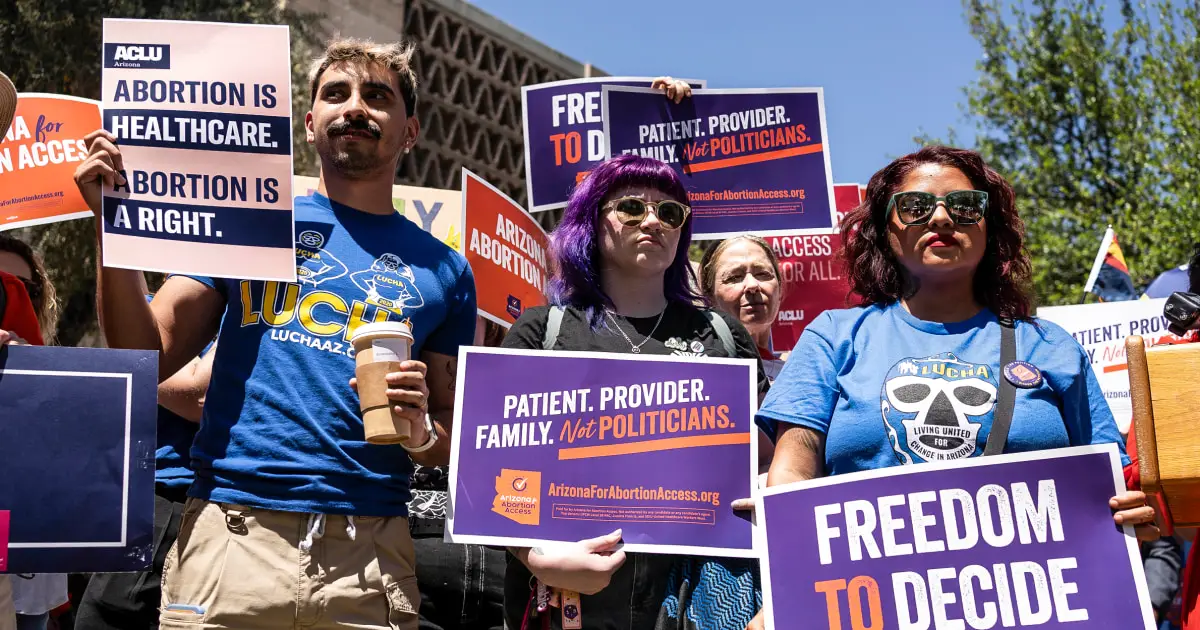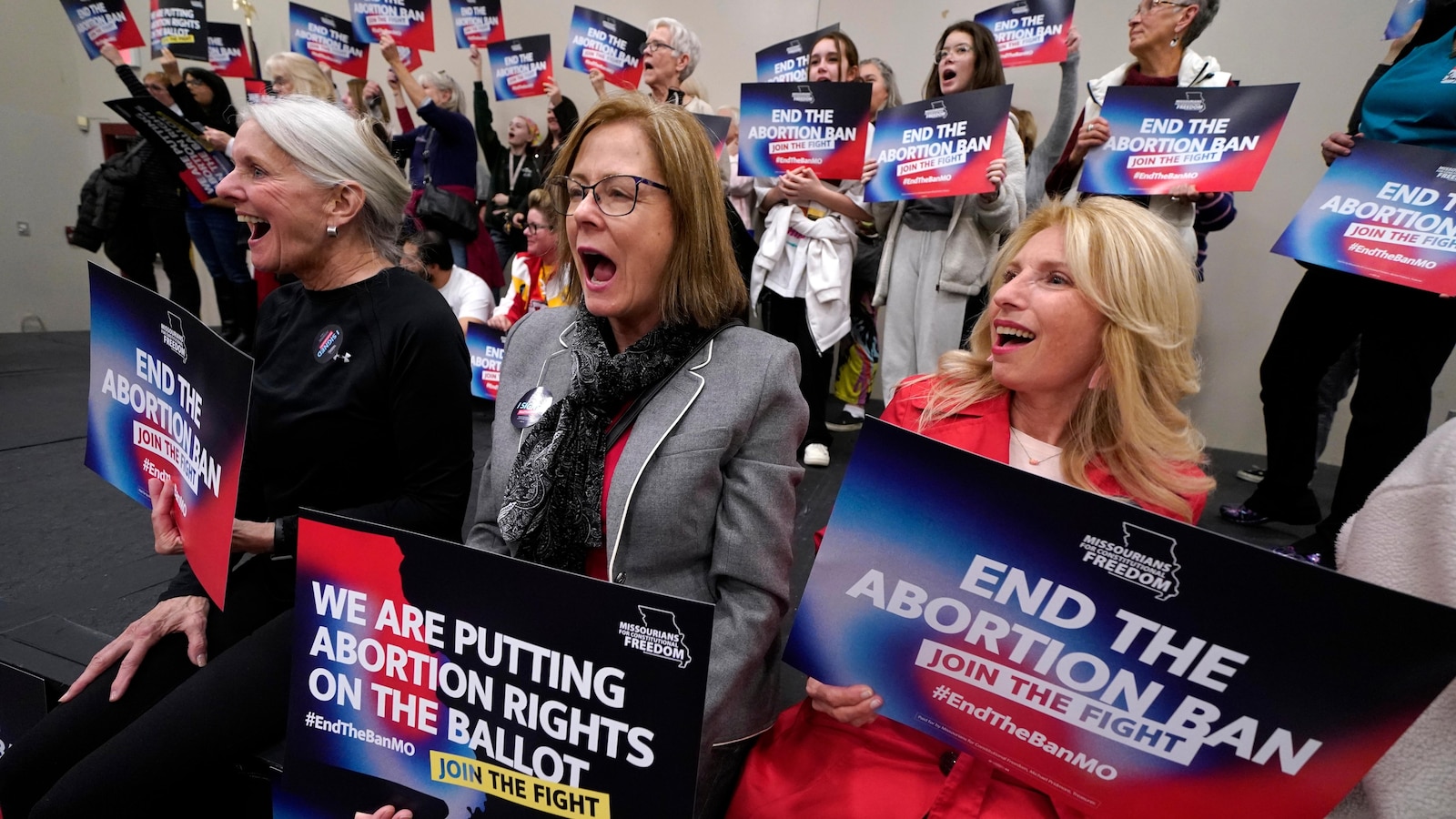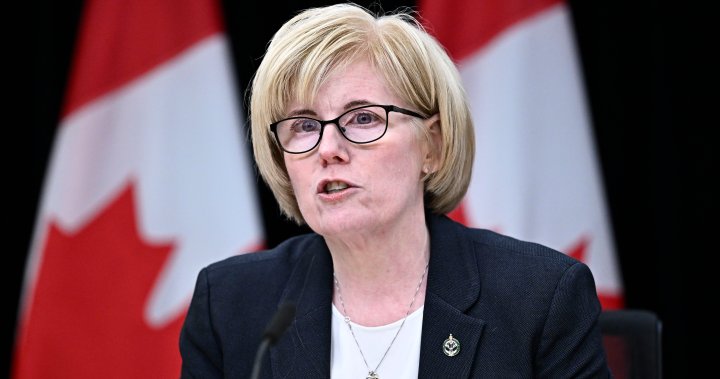

On their third attempt in three weeks, Arizona state House lawmakers voted Wednesday to pass a bill that would repeal the near-total ban on abortion from 1864 that was upheld by the battleground state’s Supreme Court earlier this month.
After a dizzying course of votes throughout the afternoon, three state House Republicans joined Democrats in approving a repeal of the Civil War-era law that made abortion a felony punishable by two to five years in prison for anyone who performs one or helps a woman obtain one.
Members of the state Senate, where Republicans also hold a narrow majority, voted last week in favor of a motion to introduce a bill that would repeal the abortion ban. Two Republicans joined every Democrat in the chamber on that vote.
The state Senate could vote on the repeal as early as next Wednesday, after the bill comes on the floor for a “third reading,” as is required under chamber rules.
The state Senate is likely to pass a repeal of the law, a source in Arizona familiar with the situation told NBC News. Once that happens, Democratic Gov. Katie Hobbs is certain to sign the repeal quickly.
The state House’s vote to repeal came on the chamber’s third attempt since the state Supreme Court ruled earlier this month to uphold the 160-year-old near-total ban.
Following that ruling, Republicans across the U.S. — including former President Donald Trump — called on legislators in the state to repeal the ban amid a broader political blowback against the GOP on the issue of reproductive rights in the nearly two years since the U.S. Supreme Court struck down Roe v. Wade.
But Republicans in the Arizona state House, where the party holds a narrow majority, had remained steadfast in not allowing a repeal bill to advance.
But on Wednesday, amid mounting pressure, Republicans in the chamber appeared to finally relent, with three GOP lawmakers — state Reps. Matt Gress, Tim Dunn and Justin Wilmeth — joining the 29 Democrats in the chamber to pass the repeal.
Republican opponents of the repeal pleaded with their colleagues to reject the bill for a third time during remarks they were allowed to make while voting.
“We should not have rushed this bill through the legislative process,” Republican state House Speaker Ben Toma said. “Instead today we are rushing to judgment.”
“It breaks my heart that you’re here to witness this,” said House Speaker Pro Tempore Travis Grantham, before casting a “no” vote. “I’m proud of my Republican caucus that has fought this off as long as it has,” added Grantham, who accused Democrats of having used the issue as a political cudgel.
“To see how this has been turned against one party and used as a weaponization of the issue is disgusting,” he said. At the end of Wednesday’s hearing, Grantham said the vote was an “awful, disgusting situation” and stripped Gress, as well as Democratic Assistant Minority Leader Oscar De Los Santos, of their committee assignments.
Just last week, during the state House’s prior session, Democrats in the chamber introduced a bill to repeal the 160-year-old abortion ban and filed a motion to Republican House leaders requesting an immediate vote. The vote failed, prompting Democrats to move again to force a vote, which also fell short.
Republicans were more easily able to kill that vote because it came under a procedural vote to suspend state House rules. Under Arizona House rules, a majority of the chamber that includes the speaker is required to vote to suspend the rules to hold an immediate vote. Such obstacles didn’t exist on Wednesday because the vote came amid normal House order.
Wednesday’s proceedings marked the latest chapter in the fight over abortion rights in the crucial battleground following the Arizona Supreme Court’s bombshell ruling earlier this month.
The law the conservative-leaning court ruled was enforceable makes abortion a felony punishable by two to five years in prison for anyone who performs one or helps a woman obtain one. The law was codified in 1901 — and again in 1913, after Arizona gained statehood — and outlaws abortion from the moment of conception but includes an exception to save the woman’s life.
The law is set to go into effect June 8, though Democratic Attorney General Kris Mayes has said her office is working to find ways to delay that date.
Despite the continued repeal efforts, voters are likely to have the power this November to decide on the future of abortion rights in the state themselves.
Organizers in the state are likely to succeed in placing a proposed constitutional amendment on the November ballot that would create a “fundamental right” to receive abortion care up until fetal viability, or about the 24th week of pregnancy. If voters approve the ballot measure, it would effectively undo the 1864 ban, which now remains law in the state.
It would also bar the state from restricting abortion care in situations in which the health or life of the pregnant person is at risk after the point of viability, according to the treating health care professional.
But the state Supreme Court decision prompted Republicans to also discuss a series of possible contingencies to upend that effort, including pushing alternative ballot measures to compete with the pro-abortion rights proposed amendment, according to a leaked strategy document circulated among Arizona Republicans.
During a brief state House Rules committee hearing Wednesday, Republicans voted to advance three resolutions — without explaining what they were — that Democrats and abortion rights supporters said were likely the GOP-backed ballot measures.
“I can’t tell you what the subject matter will be,” Grantham, the House Speaker Pro Tempore who led the hearing, said.
Chris Love, a spokesperson for Arizona for Abortion Access, called the resolutions “three dishonest placeholder bills” that served as “the first step toward referring up to three anti-abortion measures to the November ballot aimed at confusing and deceiving voters in hopes of pulling votes from the Arizona Abortion Access Act.”







